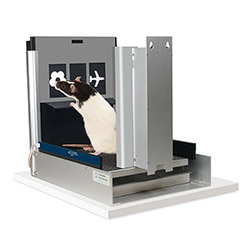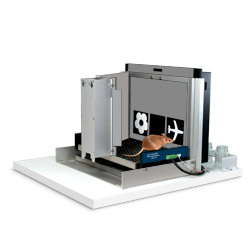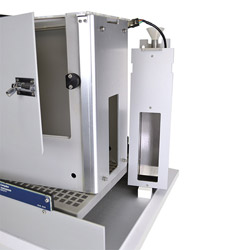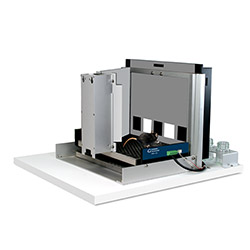Bussey-Saksida Touch Systems
The Touch Screen has been used to develop a wide range of tasks, probing different areas of cognition, most of which are available ready written with programs and information to train the rodents to the task.
The design of the Touch Screen chamber and the tasks were both found to be crucial to get good and consistent results - comparable results have been achieved by labs all over the world using the Lafayette/Campden Touch Screen and these prewritten tasks. Implementation of the smooth trapeziodal walls and extra sensitive Touch Screens significantly reduced the training times and rodent performance – minimizing distraction and making sure all nosepokes to the screen are detected.
As well as being able to compare results with other rodent Touch Screen work, the chambers also lend themselves to comparing with both NHP and Human Touch Screen Tasks.
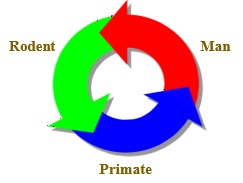
Translational Science
Human CANTAB was developed at Cambridge University, UK, from well-known animal models of behaviour. This has allowed the development of a range of cognitive tests proven to be sensitive to specific regions of the brain. These language free Human CANTAB tests have been further developed to make them suitable for monkey studies - incorporating as few changes as possible.
Monkey CANTAB was developed by a group including Drs T.W. Robbins and A.C. Roberts at the Department of Experimental Psychology, University of Cambridge, England, to improve the comparative assessment from animals to humans. The result is a battery of tests that can be used to study cognition in both experimental primates in the laboratory and humans in the clinic. Link to Monkey CANTAB Page
Professors Tim Bussey and Lisa Saksida at the Cognitive Systems Neuroscience Laboratory, University of Cambridge, England have also developed rodent touchscreen chambers and tasks for rats and mice to again find tasks that are translational to human cognitive tests.
An important consideration in the development translational tasks has been to maximise the likelihood that the same cognitive abilities are used by both animals and humans to perform each test. Consequently, complex tasks are broken down into their constituent elements and each element assessed independently of the next in a step-by-step progression through the test. Guiding a subject through the test in this way restricts the use of alternative strategies and permits an analysis of performance in terms of the cognitive components involved. Functional equivalence is suggested if the pattern of performance of animals and humans, at each stage of the test, is qualitatively similar and if comparable impairments are seen following damage to selective brain structures. A growing bibliography is building evidence that this is the case.
Key Paper - Touchscreen cognitive testing: Cross-species translation and co-clinical trials in neurodegenerative and neuropsychiatric disease, Palmer et al, Neurobiology of Learning and Memory, 2021, 107443.
One case in point concerns the Paired Associate Learning Task (PAL). In human studies early onset Alzheimer’s patients have shown significant deficiencies on this task. Humans with a DLG2 mutation have been found to be impaired on PAL. Likewise DLG2 knock out mice show impairment as shown here. [Nithianantharajah et al, Nature Neuroscience, 2013, 16]
Several strains of rats and mice have been used in the touchscreen chambers, including transgenic and knock out animals.
In a Lab Animal Review article it is also argued that the translational nature the tasks, the lack of aversive stimuli and the wide range of psychological constructs that can be evaluated, means the touchscreen method can yield significant 3Rs (Replacement, Reduction and Refinement) benefits.
